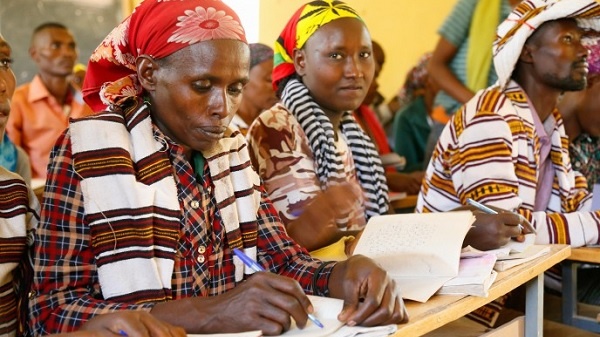
(UNESCO Institute for Lifelong Learning) – Community learning centers (CLCs) were first opened in Ethiopia as a result of the work initiated by Mr Yoseph Abera, a senior expert for adult and non-formal education in the Ethiopian Ministry of Education (MoE) and his department. Mr Abera participated in the UNESCO Institute for Lifelong Learning (UIL) CONFINTEA Fellowship Programme in 2015. Together with experts at UIL, the department developed a strategy to introduce CLCs in his country.
The strategy was developed with a view to operationalize those components of the national Education Sector Development Plan V (ESDP V) 2015–2019 oriented at improving the competencies of the Ethiopian youth and adult population through adult learning and education (ALE). Within a perspective of lifelong learning, it also aims to strengthen coordination among sectors and ministries and contribute to a ‘post-literacy’ strategy at grassroots level. Although they are a new concept for Ethiopia, CLCs are adapted to the country’s socio-economic and cultural contexts, and will receive generous resources from the Ethiopian Government.
In an interview, Yoseph* reflected on his time at UIL. ‘UIL was instrumental [to the success of the strategy]. I acquired insight from the very experienced ALE specialists at UIL, and benefited from the experiences of other fellows taking part in the CONFINTEA Program.’ He added that the strategy developed at UIL ‘helped to raise awareness in Ethiopia about the roles and functions of CLCs, especially at the grassroots level.’
Initially piloted in three Ethiopian regions – Oromia, Amhara, and the Southern Nations, Nationalities, and Peoples’ Region (SNNPR) – the project has now expanded to include Addis Ababa and the Tigray Region.
UIL, in cooperation with German (Bonn-headquartered) DVV International and the UNESCO Office in Addis Ababa, will continue to support the implementation and review of CLCs in Ethiopia.
From 2011 to 2017, UIL welcomed 38 fellows (19 men and 19 women, 31 of whom were government officials and seven NGO representatives) from 32 countries. The last cycle took place in November 2017.
What are community learning centers (CLCs)?
CLCs are local educational institutions, usually set up and managed by local people as community-driven institutions, to provide various learning opportunities with the support of the government, NGOs, and private sectors. Literacy, post-literacy, income generation, life skill programs and basic education are provided at CLCs. The learning programs in CLCs vary according to local needs and contexts in the country.
* Ethiopians use patronymic names rather than family names. That is, a person in Ethiopia is addressed by his/her given name as there is no such thing as ‘family name’ or ‘inherited name.’
